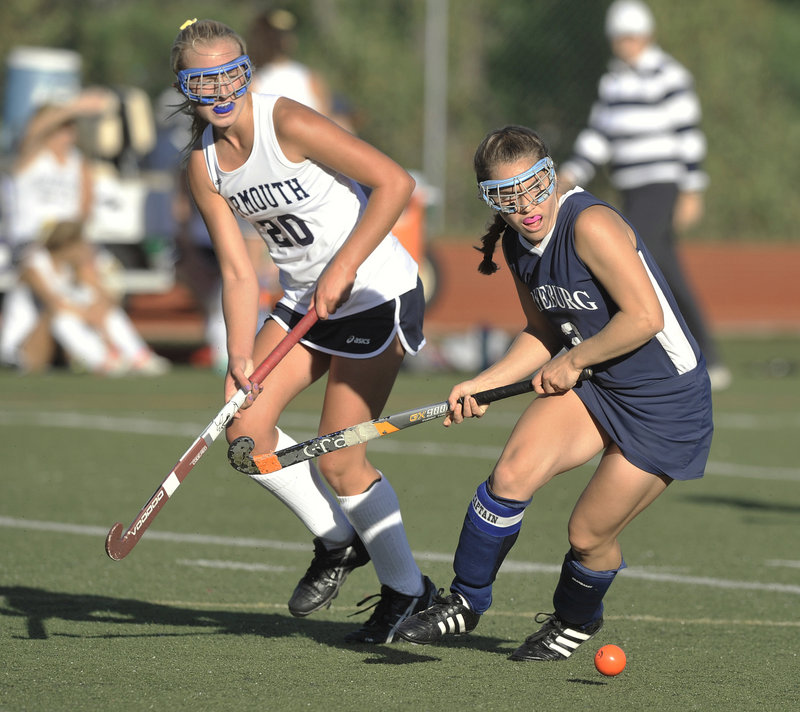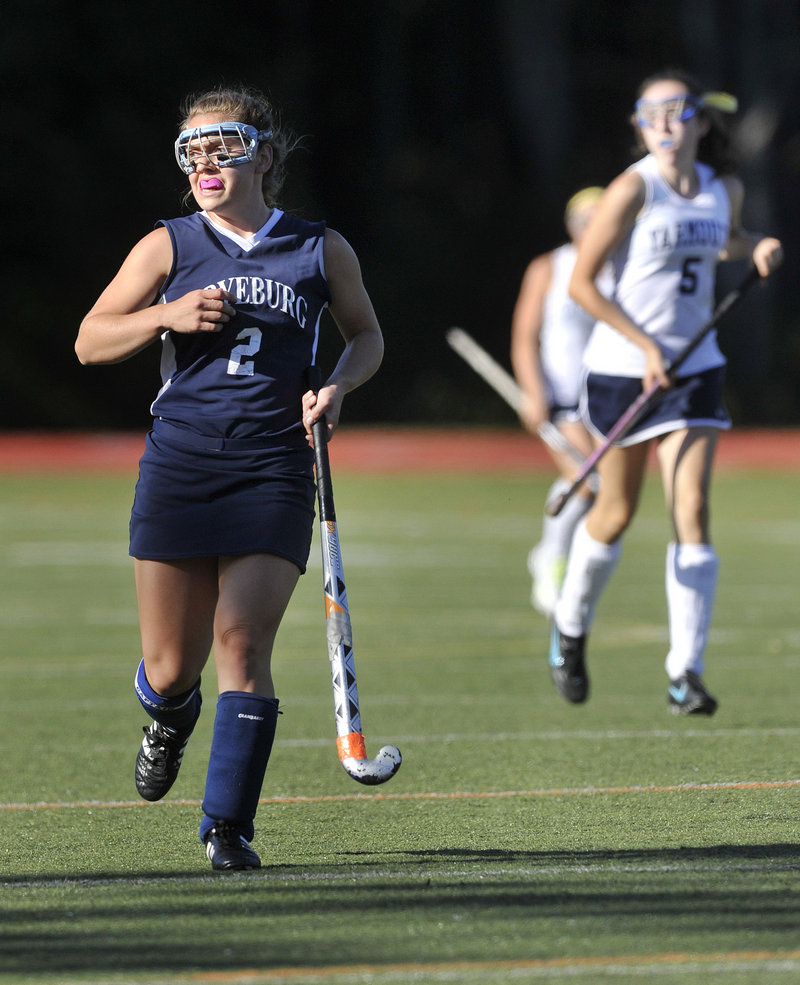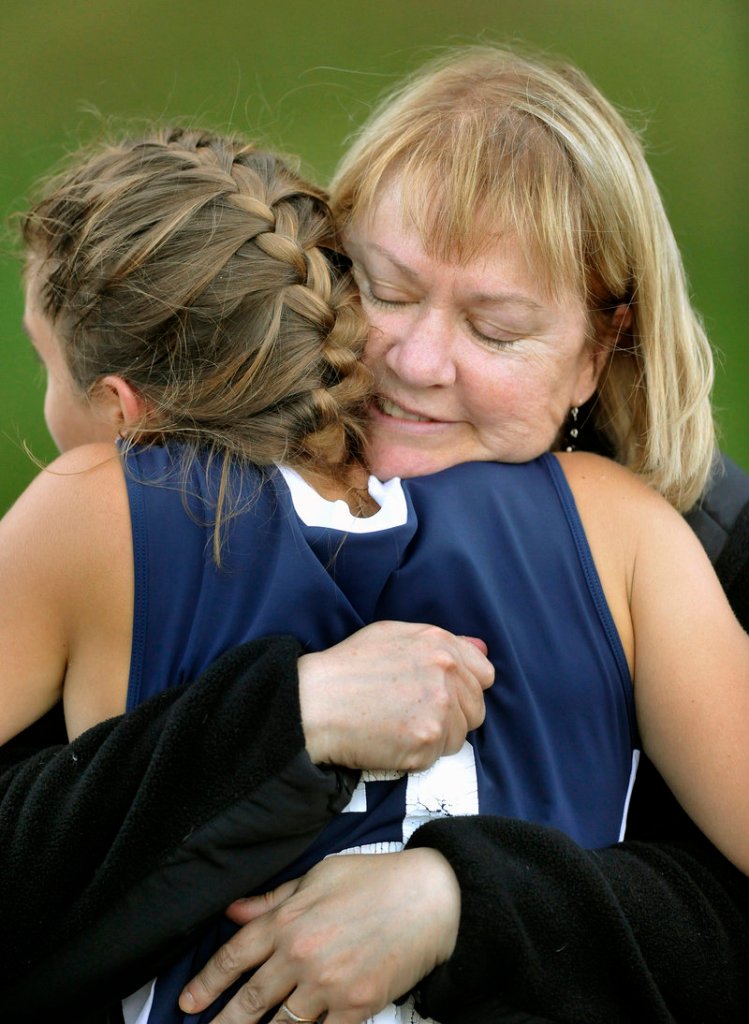Opponents of Fryeburg Academy field hockey have seen orange for the past four years — orange tape surrounding the goals, an orange ball replacing the standard white one, even orange shoelaces on the Fryeburg players.
It’s done for an unidentified Fryeburg player who is visually impaired. Even closely watching a game, you might never be able to pick her out. But keep your eyes on senior center forward Christina DiPietro as she runs past, dodges defenders and, often, scores goals.
And consider this: DiPietro is legally blind.
“I wanted them to be just so shocked when they found out that she’s the one that kicked their butts around the block and scored the goals and that’s what Christina’s always wanted,” said Fryeburg Academy Coach Dede Frost. “One of the things that amazed me when Christina first came in was that she really didn’t want anyone to treat her special. That’s why I’ve never told anyone for the past four years.
“I didn’t want them to identify her. I didn’t want them to say, ‘Oh, take it easy on No. 2 because she’s blind.’ “
Getting ready for the postseason, the Raiders finished the regular season with a 12-2 record and will play Cape Elizabeth on Tuesday in the quarterfinals of the Western B playoffs. DiPietro has scored nine goals, twice scoring three goals in one game.
“I want an equal playing field. I just want to do my best and then have everyone do their best,” the 17-year-old DiPietro said. “I want to play the game that I love, like everybody else loves the game, without anyone saying, ‘oh, that’s too bad.’ That’s the only thing that I really don’t like. … I can honestly say I’ve accepted it. I always have. But when people feel bad for me, I’m just like, why? You don’t have to.”
AN EARLY DIAGNOSIS
Ann DiPietro said she saw strong clues her daughter had a vision problem when Christina was quite young. One day Christina would find an object with ease, but if it was moved she would not be able to locate it. She often bumped into and even tripped over furniture.
Once, inside a department store, when Christina let out a bloodcurdling scream for her mother while Ann was standing right next to her, all doubt was gone.
At age 4, Christina was diagnosed as having retinitis pigmentosa, also known as RP. She underwent a lengthy, sophisticated testing process at Massachusetts Eye and Ear Infirmary at age 6 that verified the diagnosis and further identified DiPietro’s specific condition.
There are well over a hundred varieties of RP, each with unique characteristics. All are hereditary and progressively damage the light-sensitive photoreceptor cells (rods and cones) of the retina, which are responsible for capturing images. About 1 in 4,000 people in the United States suffers from retinitis pigmentosa, and there is no cure for the condition. After Christina’s diagnosis, two of Ann’s brothers were also diagnosed with retinitis pigmentosa.
In layman’s terms, the rods provide peripheral and night vision, while cones provide the color and central vision.
“Her rods are gone,” said Ann DiPietro, who, with her husband, Tim, has two daughters. The family lives in North Conway, N.H. “She has no night vision. That degeneration has been completed.”
According to Dr. Scott Steidl, a retinal specialist with Eye Care Medical Group of Portland, most normal-sighted people have a visual field of approximately 180 degrees. Retinitis pigmentosa reduces the visual field to less than 20 degrees, which is a definition of legal blindness.
DiPietro’s vision has been compared to looking at the world through a pair of drinking straws.Â

“I’ve had patients break down in my office,” Steidl said of treating people with retinitis pigmentosa. “They are so severely handicapped in so many activities because they have such a limited central field of vision.”
The cones in DiPietro’s eyes are also deteriorating, creating a blind spot in the middle of her tunnel vision and an ever-changing array of floating pigments, her mother said.
DiPietro said the deterioration of her eyesight has “definitely progressed from my freshman year to my senior year. It has, but I’ve worked with it. I’m very good at transitioning. If I lose a piece of vision I can feel it and I know it takes me a day or two to transition. I get more headaches. I might not see as well, but eventually it will be OK and I will transition smoothly.”
DiPietro has been a patient of Dr. Eliot Berson since age 6. Berson is the director of Harvard Medical School’s Berman-Gund Laboratory for the Study of Retinal Degenerations, located at Massachusetts Eye and Ear Infirmary in Boston. Berson is considered a world leader in the study of retinitis pigmentosa. DiPietro also sees Dr. Pauline Beale, a low-vision specialist in Lewiston. Berson and Beale, through their offices, both declined interview requests.
Steidl, the Portland specialist, has seen DiPietro once. He was sitting in the stands at Cape Elizabeth High School, watching his daughter’s team beat Fryeburg, 3-0, on Oct. 3. Like so many people before him, Steidl asked why one of the goals was taped in orange — and switched to the opposite end at halftime — but had no idea which Fryeburg player was legally blind.
“I think it’s unbelievable. I can’t see through her eyes, but from everything you’re saying and my own understanding, she’s making a herculean effort to do what she’s doing with what she’s got,” Steidl said.
BUILDING A TEAM EFFORT
Because DiPietro’s field of vision is so limited, when she is focused on the ball, she is unable to see the uniform tops of her teammates and opponents. For that reason, all of her teammates use orange shoelaces.
Early in Christina’s freshman season, Ann DiPietro provided the team with specialized goggles that, when worn, simulated what her daughter could actually see.
“All of us were astounded because she’s just so talented with her difficulty,” Fryeburg senior forward Ellen Bacchiocchi said. “I can’t even imagine playing like that. I felt like a horse with those blinders on. You don’t have peripheral vision. I don’t know how she does what she does, but she’s just so good at it.”
DiPietro says she’s always tried to be open and honest about her disability. The goggles activity was “important just so (teammates) have that understanding, because when I’m playing I might not know that they’re there; most of the time I really don’t unless they communicate.”
Right away, teammates learned they would have to do what coaches always ask of their players: talk to each other — and especially to DiPietro.
“They’re really receptive and understanding. If you know and understand what maybe my eyesight is, then we can work with that,” DiPietro said. “That’s how everything worked out and how we communicate so well. I think it brought us closer together.”
DiPietro said she can be effective on the field because she has learned how to cope with her limited sight by constantly scanning her surroundings and intently focusing on the ball. She is also an extremely well-conditioned athlete with quick reflexes. As impressive as her field hockey skills are, they may pale next to her other scholastic sport — downhill ski racing. DiPietro was sixth in the Class A state championship slalom and 15th in the giant slalom last February.
WORKING ‘WITH WHAT I HAVE’
One of the few things DiPietro knew she had to forgo was learning how to drive. It was a frustrating admission at first, she said, but “I am realistic. There are things I shouldn’t be doing with the sight that I have. Like driving.”
DiPietro adamantly believes advancements in technology and research will happen fast enough that she will never lose all of her sight. She is, however, prepared for the possibility of complete blindness.
DiPietro reads Braille and has done significant orientation and mobility training, which includes using a cane and learning physical surroundings to “use my eyes the best possible way, the most efficiently.”
“I think that’s honestly one of the reasons I can play field hockey because I have learned how to work with what I have,” DiPietro said. “With Braille and the support of my school and the support of my team I know if I ever go completely blind, I’ll be fine. I’m prepared.”
DiPietro expects to attend college next fall. Syracuse University, where she spent six weeks last summer doing orientation and mobility training, is high on her list. If she chooses a smaller Division III school, she is not ruling out the possibility of continuing to play field hockey.
“You can’t not do the things that you love because of one disability or obstacle,” DiPietro said. “And everyone has obstacles. This just happens to be mine.”
Staff Writer Steve Craig can be contacted at 791-6413 or at:
scraig@mainetoday.com
Twitter: SteveCCraig
Â
Send questions/comments to the editors.






Success. Please wait for the page to reload. If the page does not reload within 5 seconds, please refresh the page.
Enter your email and password to access comments.
Hi, to comment on stories you must . This profile is in addition to your subscription and website login.
Already have a commenting profile? .
Invalid username/password.
Please check your email to confirm and complete your registration.
Only subscribers are eligible to post comments. Please subscribe or login first for digital access. Here’s why.
Use the form below to reset your password. When you've submitted your account email, we will send an email with a reset code.